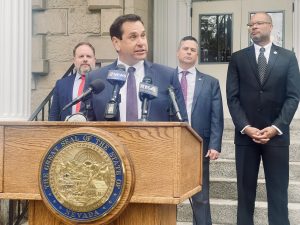California News:
The U.S. Department of Civil Rights Division of the Department of Justice, led by Assistant Attorney General Harmeet Dhillon, has twice requested voter registration records from Nevada’s Secretary of State Francisco “Cisco” Aguilar (D).
The most recent request dated August 14 (see below) alleges that Nevada failed to provide complete records per the DOJ’s initial request in mid-July. According to Dhillon, the state’s response must contain all fields of a voter’s registration record. The DOJ originally requested the records by August 21.
We have received Nevada’s statewide voter registration list (“VRL”). However, as the Attorney General requested, the electronic copy of the statewide VRL must contain all fields, including the registrant’s full name, date of birth, residential address, his or her state driver’s license number or the last four digits of the registrant’s social security number as required under the Help America Vote Act (“HAVA”)1 to register individuals for federal elections.
To the extent there are privacy concerns, the voter registration list is subject to federal privacy protections. Section 304 of the CRA [Civil Rights Act] provides the answer:
Unless otherwise ordered by a court of the United States, neither the Attorney General nor any employee of the Department of Justice, nor any other representative of the Attorney General, shall disclose any record or paper produced pursuant to this chapter, or any reproduction or copy, except to Congress and any committee thereof, governmental agencies, and in the presentation of any case or proceeding before any court or grand jury.
In a letter dated August 21, Secretary Aguilar’s office claimed the federal inquiry was “unprecedented in its scope, its purported basis, and its purported urgency.”
The letter contends, “Providing a version of the SVRL that includes the last four digits of social security numbers and driver’s license numbers would expose highly sensitive information that is confidential, not a public record per Nevada law,” then requests an indefinite amount of time to respond as the office “assesses the legality of the request.”
“As you know, there is no deadline in law for Nevada to respond to even a legitimate records request under 52 U.S.C. § 20703. Accordingly, our office will conduct the careful analysis that your request requires and will reach out to you once we have done so,” said Gabriel Di Chiara, Chief Deputy Secretary of State.
The DOJ notes “Any statewide prohibitions are clearly preempted by federal law” and expects a response by September 1.
Leading up to this back and forth between federal and state officials, President Trump signed an executive order in March instructing state and local election officials to require voters to show proof of citizenship, eliminate the counting of ballots received after Election Day, and included a caveat to withheld federal funding for states that do not comply.
In April, Secretary Aguilar and Attorney General Aaron Ford (D) led a multi-state lawsuit of Democratic Attorneys General and “voting rights” groups against the executive order alleging the order was unconstitutional, whereby the president does not have the executive authority to override state election laws.
In June, a Massachusetts federal judge ruled on behalf of the Democratic plaintiffs and blocked President Trump’s executive order. The administration has since filed an appeal.
“The federal court’s decision to block this executive order on elections is a win for voters and for our democracy. The Constitution grants states the power to administer elections, and the president’s attempt to commandeer that power had to be stopped. I’m proud that Nevada played a leading role in this lawsuit, and grateful to the team that made this victory possible,” said Secretary Aguilar.
After the federal ruling, the DOJ issued the first of two voter registration file requests to Secretary Aguilar. In turn, Aguilar’s office failed to provide and continues to delay their response.
“These requests from the DOJ may seem like a simple attempt at oversight but in reality, the federal government is using its massive power to try to intimidate us into turning over protected voter data,” Secretary Aguilar said in an statement.
What and why is this information “protected” from the DOJ?
The Globe asked these question of the Secretary of State’s office this past Monday morning, August 25– hours before Governor Joe Lombardo (R) and state agencies announced they were targets of a cyberattack the previous Sunday morning, August 24. The targeted attacked has caused continued state agency and office closures, rendering various state websites and phone lines inoperable.
Reportedly, some state employees returned to work yesterday, yet the Secretary of State’s office remains closed.

The Globe has yet to receive a reply from Aguilar’s office. It remains unknown if the office intends to respond to the DOJ by the September 1 deadline.
Last night, The Globe contacted the Governor’s office asking a series of questions related to the scope and extent of the cyberattack. We have yet to receive a response at the time of publishing,
The cyberattack has also compelled the Globe to question how this “protected” voter registration data remained protected and intact after this targeted state-wide attack, an attack that has also impacted the Department of Motor Vehicles–an entity which provides driver’s authorization cards to noncitizens and automatic voter registration (with an opt-out option).
This is a developing story.
Click this link for the original source of this article.
Author: Megan Barth
This content is courtesy of, and owned and copyrighted by, https://californiaglobe.com and its author. This content is made available by use of the public RSS feed offered by the host site and is used for educational purposes only. If you are the author or represent the host site and would like this content removed now and in the future, please contact USSANews.com using the email address in the Contact page found in the website menu.





